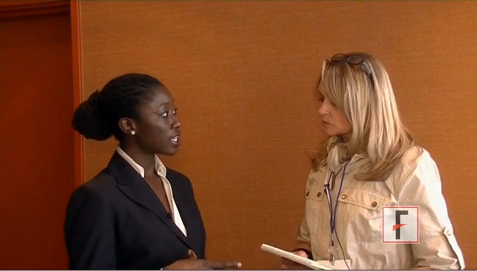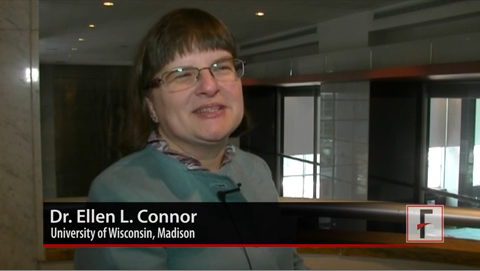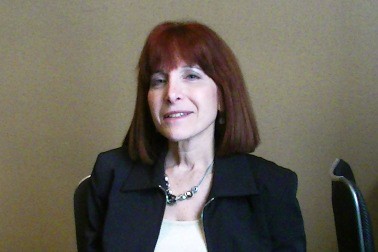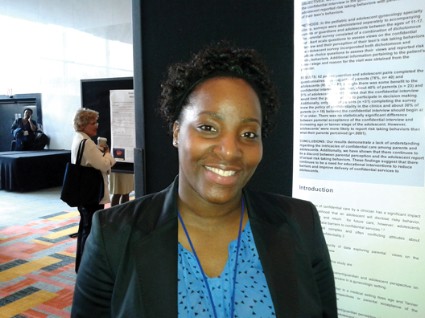User login
North American Society for Pediatric and Adolescent Gynecology (NASPAG): Annual Clinical Meeting
VIDEO: Team approach is best for successful oncofertility clinic
PHILADELPHIA – Whether you want to build an entire oncofertility clinic or just elevate the level of care your current facility offers, an integrated approach to care is key, according to Dr. Leslie A. Appiah, director of oncofertility at the University of Kentucky Medical Center, Lexington.
In a video interview at the annual meeting of the North American Society for Pediatric and Adolescent Gynecology, Dr. Appiah offers suggestions for how oncologists, gynecologists, reproductive endocrinologists, nurse managers, social workers, and others – even when they’re with other institutions – can work together to offer care that adheres to position statements on fertility rights for cancer patients from the American Society of Clinical Oncology and other associations.
Dr. Appiah also discusses how to achieve fluid communication so that fertility can be preserved without delaying cancer treatments, and best practices for oncofertility concerns in the pediatric setting.
On Twitter @whitneymcknight
The video associated with this article is no longer available on this site. Please view all of our videos on the MDedge YouTube channel
PHILADELPHIA – Whether you want to build an entire oncofertility clinic or just elevate the level of care your current facility offers, an integrated approach to care is key, according to Dr. Leslie A. Appiah, director of oncofertility at the University of Kentucky Medical Center, Lexington.
In a video interview at the annual meeting of the North American Society for Pediatric and Adolescent Gynecology, Dr. Appiah offers suggestions for how oncologists, gynecologists, reproductive endocrinologists, nurse managers, social workers, and others – even when they’re with other institutions – can work together to offer care that adheres to position statements on fertility rights for cancer patients from the American Society of Clinical Oncology and other associations.
Dr. Appiah also discusses how to achieve fluid communication so that fertility can be preserved without delaying cancer treatments, and best practices for oncofertility concerns in the pediatric setting.
On Twitter @whitneymcknight
The video associated with this article is no longer available on this site. Please view all of our videos on the MDedge YouTube channel
PHILADELPHIA – Whether you want to build an entire oncofertility clinic or just elevate the level of care your current facility offers, an integrated approach to care is key, according to Dr. Leslie A. Appiah, director of oncofertility at the University of Kentucky Medical Center, Lexington.
In a video interview at the annual meeting of the North American Society for Pediatric and Adolescent Gynecology, Dr. Appiah offers suggestions for how oncologists, gynecologists, reproductive endocrinologists, nurse managers, social workers, and others – even when they’re with other institutions – can work together to offer care that adheres to position statements on fertility rights for cancer patients from the American Society of Clinical Oncology and other associations.
Dr. Appiah also discusses how to achieve fluid communication so that fertility can be preserved without delaying cancer treatments, and best practices for oncofertility concerns in the pediatric setting.
On Twitter @whitneymcknight
The video associated with this article is no longer available on this site. Please view all of our videos on the MDedge YouTube channel
AT THE NASPAG ANNUAL MEETING
VIDEO: Abnormal endocrinology labs? Look beyond ‘usual suspects’
PHILADELPHIA – Psychiatric medications can affect prolactin levels, while antibodies can affect thyroid-stimulating hormone levels. Hirsutism may be the result of polycystic ovary syndrome – but it may also be caused by congenital adrenal hyperplasia.
And if that’s not confounding enough, physicians should add to the medical factors that can influence lab reports what Dr. Ellen L. Connor says is the importance of "knowing the typical ranges of the assays you are using, and what the ranges considered normal are at the [laboratory] you’re working with."
In a video interview at the annual meeting of the North American Society for Pediatric and Adolescent Gynecology, Dr. Connor of the department of pediatric endocrinology at the University of Wisconsin, Madison, reviews what can change prolactin levels, how to get the most clinical utility out of thyroid tests, what is the gold standard for testosterone testing in women, how best to test and interpret vitamin D levels, and what adrenal malfunctions are possible in young women. She also stresses the value of working with knowledgeable lab personnel.
The video associated with this article is no longer available on this site. Please view all of our videos on the MDedge YouTube channel
On Twitter @whitneymcknight
PHILADELPHIA – Psychiatric medications can affect prolactin levels, while antibodies can affect thyroid-stimulating hormone levels. Hirsutism may be the result of polycystic ovary syndrome – but it may also be caused by congenital adrenal hyperplasia.
And if that’s not confounding enough, physicians should add to the medical factors that can influence lab reports what Dr. Ellen L. Connor says is the importance of "knowing the typical ranges of the assays you are using, and what the ranges considered normal are at the [laboratory] you’re working with."
In a video interview at the annual meeting of the North American Society for Pediatric and Adolescent Gynecology, Dr. Connor of the department of pediatric endocrinology at the University of Wisconsin, Madison, reviews what can change prolactin levels, how to get the most clinical utility out of thyroid tests, what is the gold standard for testosterone testing in women, how best to test and interpret vitamin D levels, and what adrenal malfunctions are possible in young women. She also stresses the value of working with knowledgeable lab personnel.
The video associated with this article is no longer available on this site. Please view all of our videos on the MDedge YouTube channel
On Twitter @whitneymcknight
PHILADELPHIA – Psychiatric medications can affect prolactin levels, while antibodies can affect thyroid-stimulating hormone levels. Hirsutism may be the result of polycystic ovary syndrome – but it may also be caused by congenital adrenal hyperplasia.
And if that’s not confounding enough, physicians should add to the medical factors that can influence lab reports what Dr. Ellen L. Connor says is the importance of "knowing the typical ranges of the assays you are using, and what the ranges considered normal are at the [laboratory] you’re working with."
In a video interview at the annual meeting of the North American Society for Pediatric and Adolescent Gynecology, Dr. Connor of the department of pediatric endocrinology at the University of Wisconsin, Madison, reviews what can change prolactin levels, how to get the most clinical utility out of thyroid tests, what is the gold standard for testosterone testing in women, how best to test and interpret vitamin D levels, and what adrenal malfunctions are possible in young women. She also stresses the value of working with knowledgeable lab personnel.
The video associated with this article is no longer available on this site. Please view all of our videos on the MDedge YouTube channel
On Twitter @whitneymcknight
EXPERT ANALYSIS FROM NASPAG 2014
AUDIO: Polycystic ovary syndrome seen as ‘multiple diseases’
PHILADELPHIA – "My personal opinion is that polycystic ovary syndrome is probably multiple diseases."
That’s according to Dr. Selma Witchel, an associate professor of pediatric endocrinology at the Children’s Hospital of Pittsburgh, University of Pittsburgh Medical Center, who discussed diagnosis and management of PCOS in an interview at the annual meeting of the North American Society for Pediatric and Adolescent Gynecology.
The best approach to treating young women with PCOS depends on a number of factors, Dr. Witchel notes. She also explains the most appropriate off-label use of metformin, as well as when using it can pose risks to the patient. Dr. Witchel also discusses novel therapies, including the potential promise of acupuncture and the off-label use of statins, and how to help pediatric patients transition to adult care.
On Twitter @whitneymcknight.com
PHILADELPHIA – "My personal opinion is that polycystic ovary syndrome is probably multiple diseases."
That’s according to Dr. Selma Witchel, an associate professor of pediatric endocrinology at the Children’s Hospital of Pittsburgh, University of Pittsburgh Medical Center, who discussed diagnosis and management of PCOS in an interview at the annual meeting of the North American Society for Pediatric and Adolescent Gynecology.
The best approach to treating young women with PCOS depends on a number of factors, Dr. Witchel notes. She also explains the most appropriate off-label use of metformin, as well as when using it can pose risks to the patient. Dr. Witchel also discusses novel therapies, including the potential promise of acupuncture and the off-label use of statins, and how to help pediatric patients transition to adult care.
On Twitter @whitneymcknight.com
PHILADELPHIA – "My personal opinion is that polycystic ovary syndrome is probably multiple diseases."
That’s according to Dr. Selma Witchel, an associate professor of pediatric endocrinology at the Children’s Hospital of Pittsburgh, University of Pittsburgh Medical Center, who discussed diagnosis and management of PCOS in an interview at the annual meeting of the North American Society for Pediatric and Adolescent Gynecology.
The best approach to treating young women with PCOS depends on a number of factors, Dr. Witchel notes. She also explains the most appropriate off-label use of metformin, as well as when using it can pose risks to the patient. Dr. Witchel also discusses novel therapies, including the potential promise of acupuncture and the off-label use of statins, and how to help pediatric patients transition to adult care.
On Twitter @whitneymcknight.com
EXPERT ANALYSIS FROM THE NASPAG ANNUAL MEETING
AUDIO: Challenges, rewards face creators of pediatric oncofertility clinics
PHILADELPHIA – Few templates exist for creating a pediatric oncofertility clinic, particularly in the context of the nascent trend of pediatric oncologists treating adults with pediatric cancers.
Dr. Karen Burns is a pediatric oncologist at Cincinnati Children’s Hospital who was part of the team that created that institution’s own oncofertility clinic. She offered tips to others who are interested in creating a similar clinic or who would like to incorporate protocols honoring ASCO’s recent position statement that all persons with cancer deserve the right to have fertility discussed as part of their standard of care.
In this audio interview, from the annual meeting of the North American Society for Pediatric and Adolescent Gynecology, Dr. Burns addresses the challenges of treating adults with pediatric cancers, having conversations about fertility with minors, the role of advance directives in oncofertility, and what burdens oncologists with patients in these situations face and how they can be eased by working with a team.
On Twitter @whitneymcknight
PHILADELPHIA – Few templates exist for creating a pediatric oncofertility clinic, particularly in the context of the nascent trend of pediatric oncologists treating adults with pediatric cancers.
Dr. Karen Burns is a pediatric oncologist at Cincinnati Children’s Hospital who was part of the team that created that institution’s own oncofertility clinic. She offered tips to others who are interested in creating a similar clinic or who would like to incorporate protocols honoring ASCO’s recent position statement that all persons with cancer deserve the right to have fertility discussed as part of their standard of care.
In this audio interview, from the annual meeting of the North American Society for Pediatric and Adolescent Gynecology, Dr. Burns addresses the challenges of treating adults with pediatric cancers, having conversations about fertility with minors, the role of advance directives in oncofertility, and what burdens oncologists with patients in these situations face and how they can be eased by working with a team.
On Twitter @whitneymcknight
PHILADELPHIA – Few templates exist for creating a pediatric oncofertility clinic, particularly in the context of the nascent trend of pediatric oncologists treating adults with pediatric cancers.
Dr. Karen Burns is a pediatric oncologist at Cincinnati Children’s Hospital who was part of the team that created that institution’s own oncofertility clinic. She offered tips to others who are interested in creating a similar clinic or who would like to incorporate protocols honoring ASCO’s recent position statement that all persons with cancer deserve the right to have fertility discussed as part of their standard of care.
In this audio interview, from the annual meeting of the North American Society for Pediatric and Adolescent Gynecology, Dr. Burns addresses the challenges of treating adults with pediatric cancers, having conversations about fertility with minors, the role of advance directives in oncofertility, and what burdens oncologists with patients in these situations face and how they can be eased by working with a team.
On Twitter @whitneymcknight
EXPERT ANALYSIS FROM THE NASPAG ANNUAL MEETING
AUDIO: Half of families don’t know daughters’ rights in confidential gyn. interview
PHILADELPHIA – Even when parents believe that allowing their adolescent daughter to have a confidential gynecologic interview is to her benefit, they misunderstand the purpose and value of the interview at least half the time.
That’s according to Dr. Gylynthia Trotman, a second-year fellow at Medstar Washington Hospital Center, Children’s National Medical Center, Washington, who presented survey data on the topic during a poster session at the annual meeting of the North American Society for Pediatric and Adolescent Gynecology.
Dr. Trotman and her colleagues found that half of the 62 pairs of parents of adolescent girls aged 11-17 years who’d been seen in a gynecologic specialty clinic feared that if their child were to discuss her health concerns alone with the physician, then the parents would be excluded from the decision-making process.
"The majority of parents felt that this was inappropriate for their teen, because this was a specialized setting," Dr. Trotman said.
In this audio interview, Dr. Trotman explains what families misperceive about the confidential interview and why.
On Twitter @whitneymcknight
PHILADELPHIA – Even when parents believe that allowing their adolescent daughter to have a confidential gynecologic interview is to her benefit, they misunderstand the purpose and value of the interview at least half the time.
That’s according to Dr. Gylynthia Trotman, a second-year fellow at Medstar Washington Hospital Center, Children’s National Medical Center, Washington, who presented survey data on the topic during a poster session at the annual meeting of the North American Society for Pediatric and Adolescent Gynecology.
Dr. Trotman and her colleagues found that half of the 62 pairs of parents of adolescent girls aged 11-17 years who’d been seen in a gynecologic specialty clinic feared that if their child were to discuss her health concerns alone with the physician, then the parents would be excluded from the decision-making process.
"The majority of parents felt that this was inappropriate for their teen, because this was a specialized setting," Dr. Trotman said.
In this audio interview, Dr. Trotman explains what families misperceive about the confidential interview and why.
On Twitter @whitneymcknight
PHILADELPHIA – Even when parents believe that allowing their adolescent daughter to have a confidential gynecologic interview is to her benefit, they misunderstand the purpose and value of the interview at least half the time.
That’s according to Dr. Gylynthia Trotman, a second-year fellow at Medstar Washington Hospital Center, Children’s National Medical Center, Washington, who presented survey data on the topic during a poster session at the annual meeting of the North American Society for Pediatric and Adolescent Gynecology.
Dr. Trotman and her colleagues found that half of the 62 pairs of parents of adolescent girls aged 11-17 years who’d been seen in a gynecologic specialty clinic feared that if their child were to discuss her health concerns alone with the physician, then the parents would be excluded from the decision-making process.
"The majority of parents felt that this was inappropriate for their teen, because this was a specialized setting," Dr. Trotman said.
In this audio interview, Dr. Trotman explains what families misperceive about the confidential interview and why.
On Twitter @whitneymcknight
AT THE NASPAG ANNUAL MEETING



